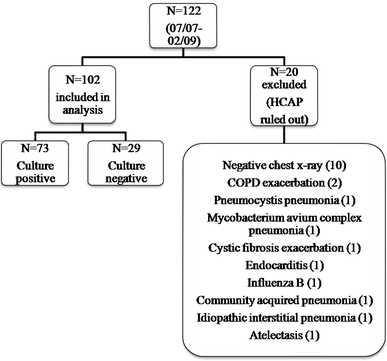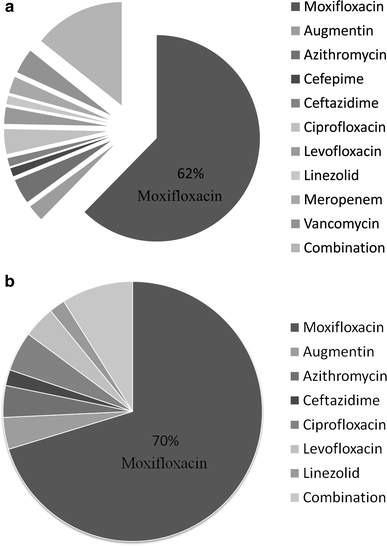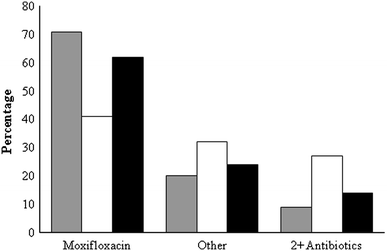Practice patterns for antibiotic de-escalation in culture-negative healthcare-associated pneumonia - PubMed (original) (raw)
Practice patterns for antibiotic de-escalation in culture-negative healthcare-associated pneumonia
M Schlueter et al. Infection. 2010 Oct.
Abstract
Background: Published guidelines for the treatment of healthcare-associated pneumonia (HCAP) recommend initial broad-spectrum antibiotics with appropriate de-escalation based on culture results. Guideline recommendations are based on data from intubated patients, in whom cultures are easily obtained. The approach to antibiotic de-escalation for culture-negative patients has not been addressed. Consequently, there are no published reports that describe the current standard of practice.
Patients and methods: All patients admitted to a university hospital with a diagnosis of HCAP, as defined by use of a pneumonia orderset, were identified retrospectively over a 2-year period. Antibiotics prescribed on admission, during hospital stay, and on discharge were recorded. De-escalation was defined as a change in the initial antibiotic therapy from broad- to narrow-spectrum coverage within 14 days of the initial prescription. The Pneumonia Severity Index was used for risk-adjustment.
Results: A total of 102 patients were included in the analysis; of these, 72% (n = 73) were culture-negative. There were more males in the culture-negative than culture-positive group; otherwise, baseline characteristics were similar. Antibiotic therapy was de-escalated in 75% of the culture-negative group and 77% of the culture-positive group (p = 1.00). Culture-negative patients were de-escalated approximately 1 day earlier than culture-positive patients (3.93 vs. 5.04 days, p = 0.03). Culture-negative patients who were de-escalated had a shorter length of hospitalization, lower hospital costs, and lower mortality rates. In 70% of the culture-negative patients, a respiratory fluoroquinolone was chosen for de-escalation.
Conclusion: In this single-center study, most of the patients with culture-negative HCAP were safely de-escalated to a respiratory fluoroquinolone.
Figures
Fig. 1
Patients included in the analysis. HCAP Healthcare-acquired pneumonia, COPD chronic obstructive pulmonary disease
Fig. 2
Prescribing patterns for de-escalation therapy. a Combined groups (culture-positive + culture-negative patients; n = 77). b Culture-negative patients (n = 55)
Fig. 3
Antibiotic utilization for de-escalation therapy in patients with HCAP. Gray-shaded column Culture-negative patients (n = 55), open column culture-positive patients (n = 22), black- shaded column combined groups (culture-positive + culture-negative patients; n = 77). Other Augmentin, azithromycin, cefepime, ceftazidime, ciprofloxacin, levofloxacin, linezolid, meropenem, vancomycin
Similar articles
- Predictors of Treatment Failure Following De-escalation to a Fluoroquinolone in Culture-Negative Nosocomial Pneumonia.
Bultas AC, Bery AI, Deal EN, Hartmann AP, Richter SK, Call WB. Bultas AC, et al. Ann Pharmacother. 2019 Dec;53(12):1207-1213. doi: 10.1177/1060028019867114. Epub 2019 Jul 26. Ann Pharmacother. 2019. PMID: 31347400 - A comparison of culture-positive and culture-negative health-care-associated pneumonia.
Labelle AJ, Arnold H, Reichley RM, Micek ST, Kollef MH. Labelle AJ, et al. Chest. 2010 May;137(5):1130-7. doi: 10.1378/chest.09-1652. Epub 2009 Dec 4. Chest. 2010. PMID: 19965954 - Healthcare-associated pneumonia is a heterogeneous disease, and all patients do not need the same broad-spectrum antibiotic therapy as complex nosocomial pneumonia.
Brito V, Niederman MS. Brito V, et al. Curr Opin Infect Dis. 2009 Jun;22(3):316-25. doi: 10.1097/QCO.0b013e328329fa4e. Curr Opin Infect Dis. 2009. PMID: 19352176 Review. - De-escalation therapy in ventilator-associated pneumonia.
Niederman MS. Niederman MS. Curr Opin Crit Care. 2006 Oct;12(5):452-7. doi: 10.1097/01.ccx.0000244126.84989.a2. Curr Opin Crit Care. 2006. PMID: 16943725 Review.
Cited by
- Health care-associated pneumonia in the intensive care unit: Guideline-concordant antibiotics and outcomes.
Attridge RT, Frei CR, Pugh MJ, Lawson KA, Ryan L, Anzueto A, Metersky ML, Restrepo MI, Mortensen EM. Attridge RT, et al. J Crit Care. 2016 Dec;36:265-271. doi: 10.1016/j.jcrc.2016.08.004. Epub 2016 Aug 11. J Crit Care. 2016. PMID: 27595461 Free PMC article. - Assessment of empirical antibiotic therapy optimisation in six hospitals: an observational cohort study.
Braykov NP, Morgan DJ, Schweizer ML, Uslan DZ, Kelesidis T, Weisenberg SA, Johannsson B, Young H, Cantey J, Srinivasan A, Perencevich E, Septimus E, Laxminarayan R. Braykov NP, et al. Lancet Infect Dis. 2014 Dec;14(12):1220-7. doi: 10.1016/S1473-3099(14)70952-1. Epub 2014 Nov 17. Lancet Infect Dis. 2014. PMID: 25455989 Free PMC article. - The impact of antimicrobial de-escalation therapy in culture-negative pneumonia: a systematic review and meta-analysis.
Song JU, Lee J. Song JU, et al. Korean J Intern Med. 2023 Sep;38(5):704-713. doi: 10.3904/kjim.2023.115. Epub 2023 Aug 17. Korean J Intern Med. 2023. PMID: 37586813 Free PMC article. - Safety and feasibility of antibiotic de-escalation in bacteremic pneumonia.
Khasawneh FA, Karim A, Mahmood T, Ahmed S, Jaffri SF, Mehmood M. Khasawneh FA, et al. Infect Drug Resist. 2014 Jun 27;7:177-82. doi: 10.2147/IDR.S65928. eCollection 2014. Infect Drug Resist. 2014. PMID: 25061323 Free PMC article. - Strategies to enhance rational use of antibiotics in hospital: a guideline by the German Society for Infectious Diseases.
de With K, Allerberger F, Amann S, Apfalter P, Brodt HR, Eckmanns T, Fellhauer M, Geiss HK, Janata O, Krause R, Lemmen S, Meyer E, Mittermayer H, Porsche U, Presterl E, Reuter S, Sinha B, Strauß R, Wechsler-Fördös A, Wenisch C, Kern WV. de With K, et al. Infection. 2016 Jun;44(3):395-439. doi: 10.1007/s15010-016-0885-z. Infection. 2016. PMID: 27066980 Free PMC article.
References
- Guidelines for the management of adults with hospital-acquired, ventilator-associated, and healthcare-associated pneumonia. Am J Respir Crit Care Med. 2005;171:388–416. - PubMed
- Venditti M, Falcone M, Corrao S, et al. Outcomes of patients hospitalized with community-acquired, health care-associated, and hospital-acquired pneumonia. Ann Intern Med. 2009;150:19–26. - PubMed


